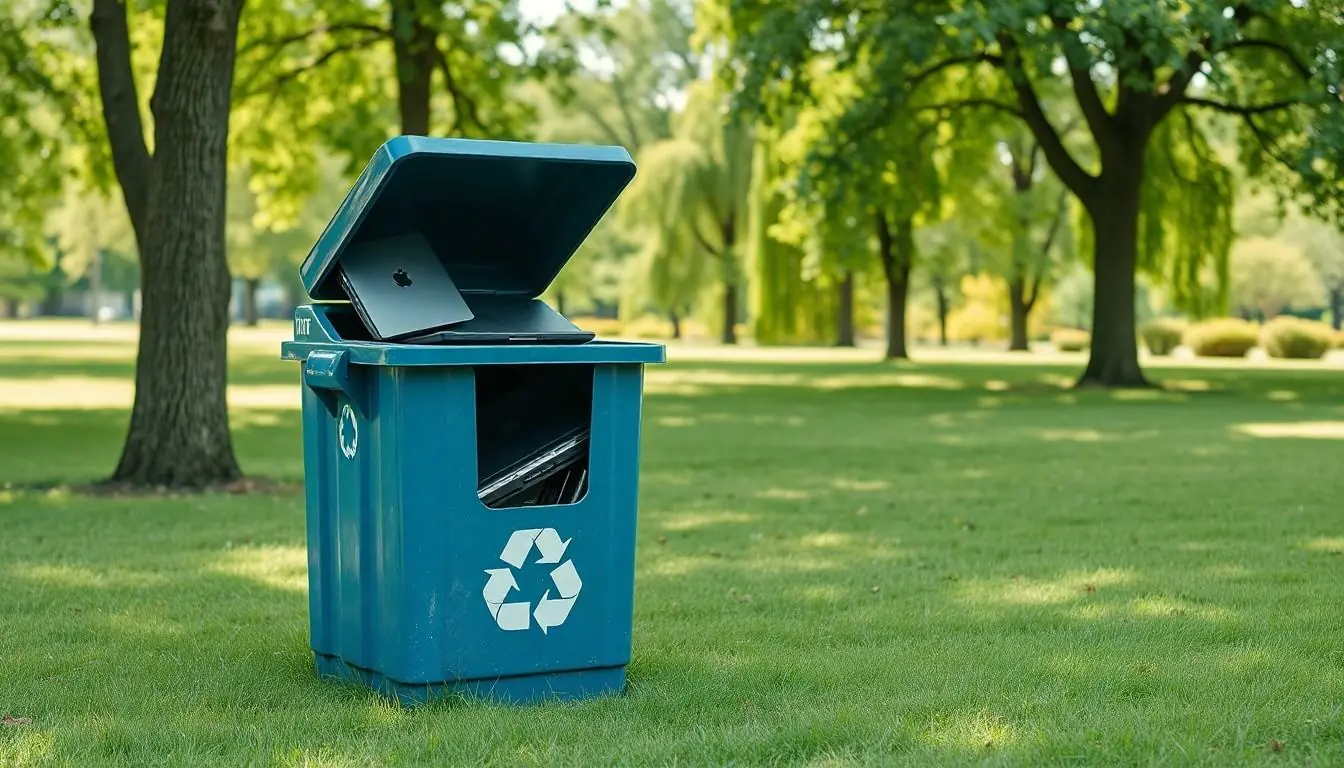Old laptops piling up in the corner? They might be gathering dust but they’re also collecting secrets—and not the good kind. It’s time to face the music and figure out how to dispose of those relics responsibly. After all, just because you’ve moved on to the latest tech doesn’t mean your old devices deserve a sad end in a landfill.
Table of Contents
ToggleImportance Of Proper Laptop Disposal
Responsible laptop disposal matters significantly for several reasons. Protecting sensitive information ranks first on the list. Laptops often store personal data, financial records, and confidential work information. Inadequate disposal can lead to data breaches, resulting in identity theft or financial loss.
Environmental impact closely follows. Laptops contain hazardous materials like lead and mercury. These components pose risks to soil and water if laptops end up in landfills. Proper disposal methods prevent toxic substances from entering the ecosystem. Recycling old laptops contributes to a circular economy by allowing materials to be repurposed for new products. This process conserves natural resources and reduces demand for new raw materials.
Legal considerations also come into play. Many regions enforce laws regarding e-waste disposal. Failure to comply with these regulations can lead to fines and other penalties. Understanding local laws promotes responsibility among individuals and businesses.
Moreover, ethical concerns arise. Many organizations encourage sustainable practices among their members. Prioritizing responsible disposal reflects positively on individuals and companies, showcasing a commitment to sustainability.
Proper laptop disposal protects personal information, minimizes environmental damage, adheres to legal standards, and fosters ethical responsibility. Each of these factors highlights the critical nature of responsible disposal methods.
Environmental Impact Of Electronic Waste

Electronic waste, or e-waste, poses significant environmental challenges due to the hazardous materials found in devices like laptops. Improper disposal of e-waste leads to soil and water contamination, threatening ecosystems and public health.
Dangers Of E-Waste Pollution
E-waste contains toxic substances like lead, mercury, and cadmium. These materials seep into the ground, contaminating soil and entering the water supply. Exposure to these toxins can harm wildlife and disrupt entire ecosystems. Health impacts on humans include increased risks of cancer and neurological damage. Studies indicate that countries with high e-waste pollution levels experience more significant health issues among their populations. Reducing e-waste through proper disposal mitigates these dangers.
Benefits Of Responsible Disposal
Responsible laptop disposal significantly reduces environmental harm. Recycling programs recover valuable materials such as copper, gold, and plastic, fostering a circular economy. Through proper disposal, individuals contribute to resource conservation and minimize the need for new raw materials. Moreover, responsible disposal practices prevent toxic leakages into the environment. Communities benefit from cleaner landscapes and safer drinking water. Legal compliance is another benefit, as adherence to e-waste disposal laws avoids potential fines. Engaging in sustainable disposal practices enhances a company’s or individual’s ethical standing.
Options For Disposing Old Laptops
Various methods exist for disposing of old laptops, and choosing the right option can make a significant difference. It’s essential to explore environmentally friendly and responsible methods.
Recycling Programs
Numerous recycling programs specialize in electronic waste, ensuring safe disposal. These programs recover valuable materials from laptops, including metals and plastics, reducing the need for new raw materials. Many cities offer e-waste collection events or designated drop-off locations. Organizations like the Electronics TakeBack Coalition provide resources for locating recycling facilities. Participants in recycling programs contribute to reducing hazardous waste in landfills, promoting a healthier environment.
Donation And Reuse
Donating laptops offers another viable option, as many charities or schools welcome working devices. Nonprofits like Goodwill or local organizations often accept laptops for educational use. Before donating, individuals should ensure that devices are in good condition and erase personal data. Finding community initiatives that refurbish laptops can also extend their lifespan. Reusing laptops not only helps others but also minimizes electronic waste, fostering a sustainable mindset across communities.
Selling Or Trade-In Options
Selling or trading in old laptops provides potential monetary benefits and encourages responsible disposal. Many retailers and online platforms offer trade-in programs, allowing users to exchange devices for store credit or cash. Researching resale options such as eBay or Craigslist can yield successful sales. Sellers should focus on removing sensitive data from devices before final transactions. Engaging in this option not only recycles electronic materials but also supports a circular economy by keeping laptops in circulation.
Steps To Prepare Your Laptop For Disposal
Preparing an old laptop for disposal involves critical steps to ensure data security and responsible eco-friendly practices.
Data Backup And Transfer
Backing up important files must come first. Users can utilize external hard drives or cloud storage services for this purpose. Transferring documents, photos, and videos ensures essential data remains intact. Consider applications like Google Drive or Dropbox for convenient access across devices. Companies should standardize this process to maintain organizational data integrity. Lastly, performing a thorough inventory helps identify what to keep versus what to discard.
Data Wiping And Security Measures
Data wiping is vital for protecting personal information. First, built-in tools like Windows Reset or macOS Recovery provide options to erase data securely. Using third-party software adds an extra layer of security. After wiping data, removing physical components, such as hard drives, enhances protection further. While preparing a laptop for disposal, employing these methods minimizes the risk of data breaches. Confirming a clean drive through verification processes ensures no sensitive material remains accessible.
Disposing of old laptops isn’t just about getting rid of unwanted devices. It’s a vital step in protecting personal information and the environment. By choosing responsible disposal methods, individuals and organizations can help prevent data breaches and reduce harmful e-waste impact.
Embracing options like recycling, donating, or selling old laptops not only promotes sustainability but also contributes to a healthier planet. Proper preparation ensures sensitive data is secured and materials are repurposed effectively.
Taking these actions reflects a commitment to ethical responsibility and community well-being. Prioritizing responsible laptop disposal is essential for a cleaner future and a more sustainable world.



